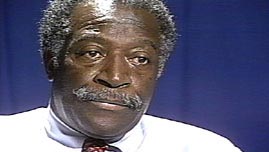Joe Dickson grew up in Fairfield, Alabama, an industrial town adjacent
to Birmingham, in the 1930s and 1940s. At the time, Birmingham was one
of the most segregated cities in the South. Segregation ordinances made
it illegal for blacks and whites to sit together in any public facility,
from parks and restaurants to buses and classrooms, and they were often
enforced with violence against African Americans. Local police offered
no protection. In fact, many city officials and local police officers
belonged to the Ku Klux Klan, a white supremacist organization that used
terrorist tactics to enforce segregation.
Dickson attended local segregated schools. Black schools had less
funding and fewer resources than white schools, but Dickson was a strong
student and was considered a leader among his peers. In 1953, following
his graduation from high school, Joe was drafted into the Army and
served for two years. In 1954, the Supreme Court ruled in
Brown v.
Board of Education that segregated schools were unconstitutional,
but it would take years for many states to comply. In the meantime,
limited access to equal education and employment opportunities
determined the economic outlook for most African Americans. For the
average young black man in Birmingham, the best employment opportunities
were in local mines and mills. It was dirty, hot, and dangerous work.
Dickson got a job as a dishwasher.
In 1955, he enrolled in Miles College, a predominantly black college on
the outskirts of Birmingham. At Miles, Dickson led student protests
against segregation and worked against voting discrimination. Although
the Fifteenth Amendment of 1871 prohibited discrimination in voting,
very few African Americans could actually register to vote in Birmingham
and other southern cities. In order to register, African Americans had
to pass random literacy tests, asking such questions as: How many
bubbles are in a bar of soap? How many grains of sand are on the
seashore? Poll taxes, random hours at the registrar's office, and
violence against those who tried to register also kept the numbers very
low. In 1955, despite these obstacles, Dickson became a registered voter
and helped others pass the voter registration test.
After graduating from Miles College, Dickson worked as an insurance
agent for Dr. A.G. Gaston, the only black millionaire in the city. He
later attended Howard Law School, and moved to New York. By then the bus
boycotts, Freedom Rides, school desegregation efforts, and incidents of
racial violence defined the Civil Rights movement and generated national
coverage of civil rights issues. In 1962, after seeing a special report
on Birmingham's racial tension, Dickson moved back to Birmingham. There,
he participated in a student-led boycott of downtown businesses that
discriminated against African Americans in hiring and service.
The selective buying campaign, as it was called, used black buying power
to leverage for equal rights. By creating an economic crisis, Dickson
and other demonstrators forced white business owners to listen to their
demands for equality. The boycott and subsequent activities of the
Alabama Christian Movement for Human Rights set the stage for Martin
Luther King Jr. and the Southern Christian Leadership's campaign of
1963, and ultimately led to the desegregation of Birmingham.

 Loading Standards
Loading Standards